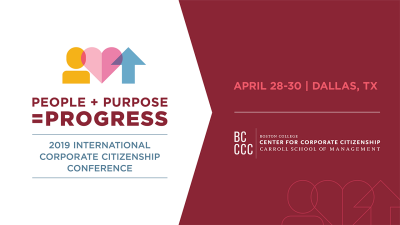People + Purpose = Progress

Something amazing happens when people unite to advance ambitious goals: the goals become possible to achieve! Because many people spend the majority of their waking lives at work, companies are uniquely positioned to apply collective action to achieve positive social, environmental, and economic change.
Of course you are well aware that this work has begun already. Companies are collaborating across competitive boundaries, as we see in the hundreds of firms from Adobe to Estée Lauder who have committed to being ‘Still In’ on the principles and practices outlined in the Paris Climate Agreement; or Chevron, which recently joined with other oil and gas companies to support curbing greenhouse gas emissions. Firms are also building movements internally to move the needle on pressing issues. Mary Kay leverages the skills and access of its 3.5 million Independent Beauty Consultants around the world through its Don’t Look Away campaign, which works to educate the public on recognizing the signs of an abusive relationship and how to take action.
In these examples, we see companies taking the lead and working together to tackle audacious goals on a global scale. Arguably the most prominent example of such ambitions is embodied in the UN’s Sustainable Development Goals. With 17 goals and 169 targets ranging from education to inequality to economic growth and the environment, determining which SDGs best match up with your business can feel like an impossible task. But companies like Dow Chemical and Royal Bank of Canada (RBC) are already aligning their sustainability goals and measurement tactics (respectively) with the SDGs.
At last year’s International Corporate Citizenship Conference, UPS exemplified this spirit of collaboration by bringing together its partners from private and public sectors alike to report on their SDGs progress. As part of the talk, Sue Stephenson, interim CEO of IMPACT2030, highlighted an important business benefit that such partnerships offer companies: engaged employees. “We hear so much about purpose—employees want to be connected to a sense of purpose,” she said. “The SDGs offer this, they provide a common framework that enables your employees to feel connected to global goals.” UPS in particular strives to make the SDGs resonate with employees around the world, and right up to buy-in from executive leadership.
As a corporate citizenship professional, you inspire the passions of many people—employees, colleagues, community leaders, and so many other key stakeholders—to lend their talents to purposeful work that improves our world. Delivering progress requires thoughtful collaboration, meaningful partnership, and more importantly, a focused strategy that employs the strengths of each individual.
